The Debut Evo 2 represents the fifth generation of Pro-Ject’s acclaimed Debut line, a series celebrated for its quality and accessibility. With upgrades inspired by Pro-Ject’s higher-end turntables, could this be the ultimate “sweet spot” model for those seeking affordable audiophile sound?
The last Debut model I reviewed, the Debut Carbon Evo, introduced several welcome enhancements to the series. Most significantly, the first Evo model introduced motor speed control, removing the need to manually adjust the drive-belt to switch between 33 1/3 and 45 RPM. In addition, the original Evo featured several design improvements to control unwanted resonance. As a core principle of Pro-Ject’s design philosophy, this trend continues with the Evo 2.
What’s New?
Platter Upgrade:
The new aluminium platter is much heavier and uses a TPE ring inside to dampen unwanted resonances. The original Evo model had TPE treatment too, but the additional weight adds greater inertia, which is great for speed consistency.
A quick tap of the platter with a hand showcases that this platter is indeed very “dead sounding” and doesn’t ring in the slightest like so many other metal turntable platters.
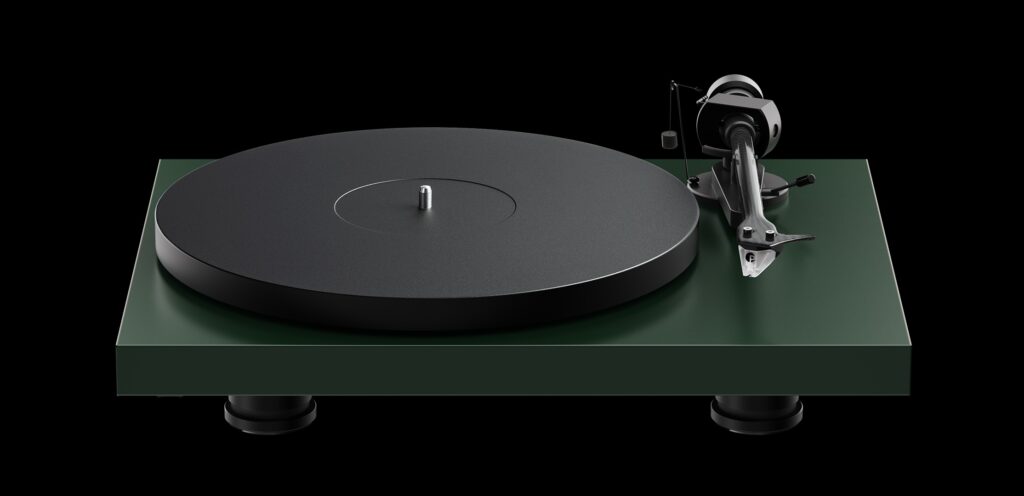
Tonearm & Cartridge
This model sports Pro-Ject’s signature 8.6-inch carbon fiber tonearm, renowned for its rigidity and lightweight design. The carbon fiber is said to minimize resonance while maintaining excellent tracking accuracy (an essential factor in achieving clear, undistorted sound).
Moreover, the tonearm now has a larger CNC-milled aluminum bearing block, which facilitates even greater control over resonance and stability during playback. As always, very low friction bearings and stability remain at the heart of Pro-Jects ethos when designing tonearms.
Pro-Ject have also added TPE damping to the tonearm counterweight, a feature previously reserved for their higher-end models.
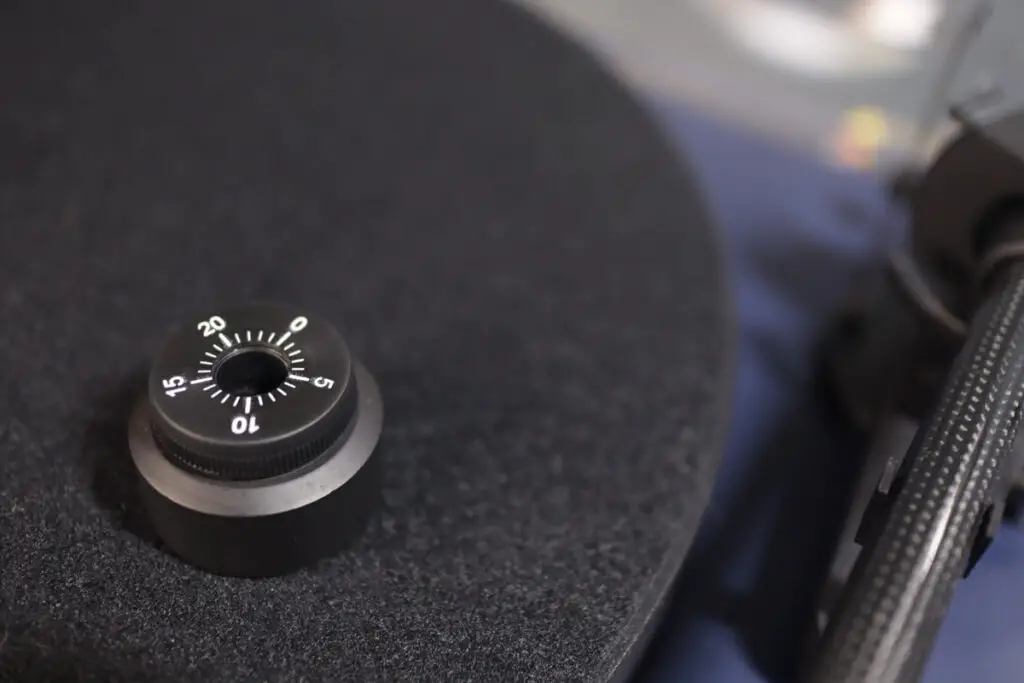
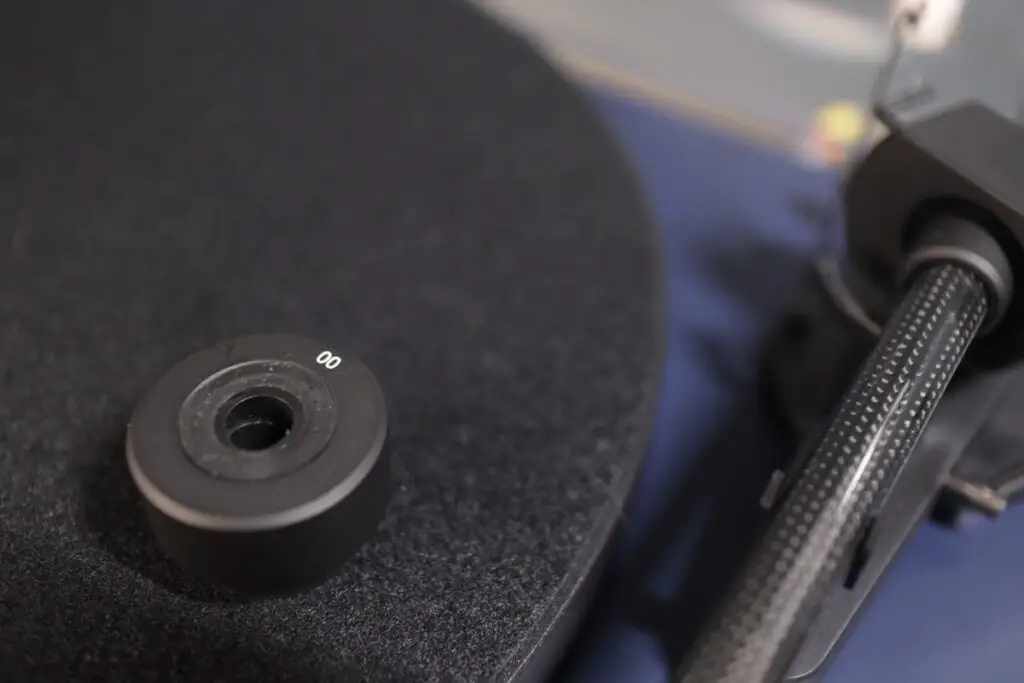
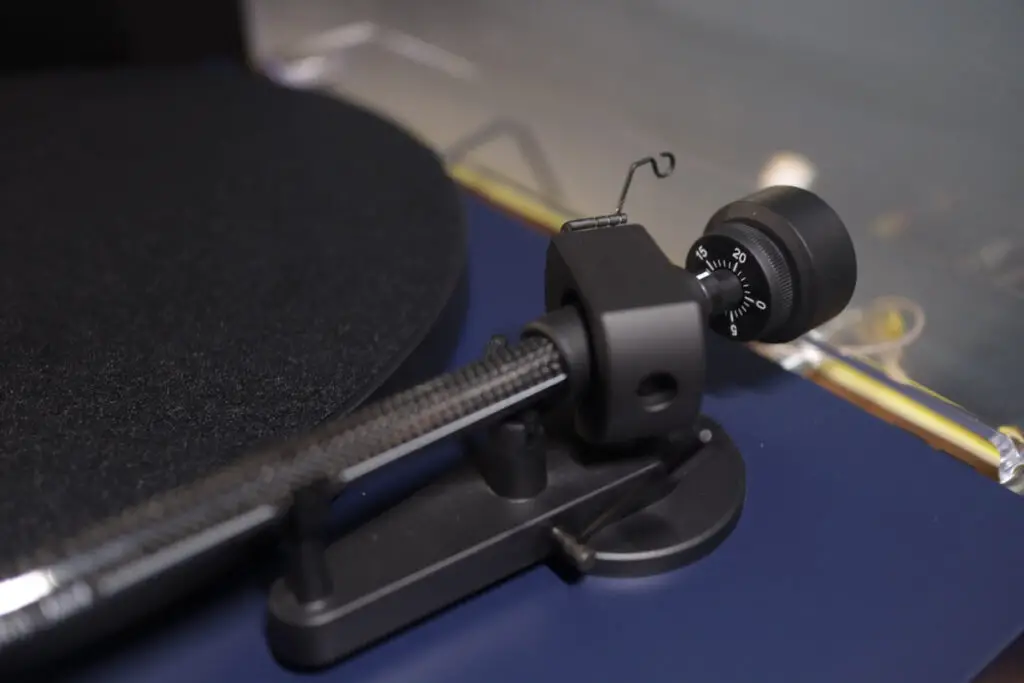
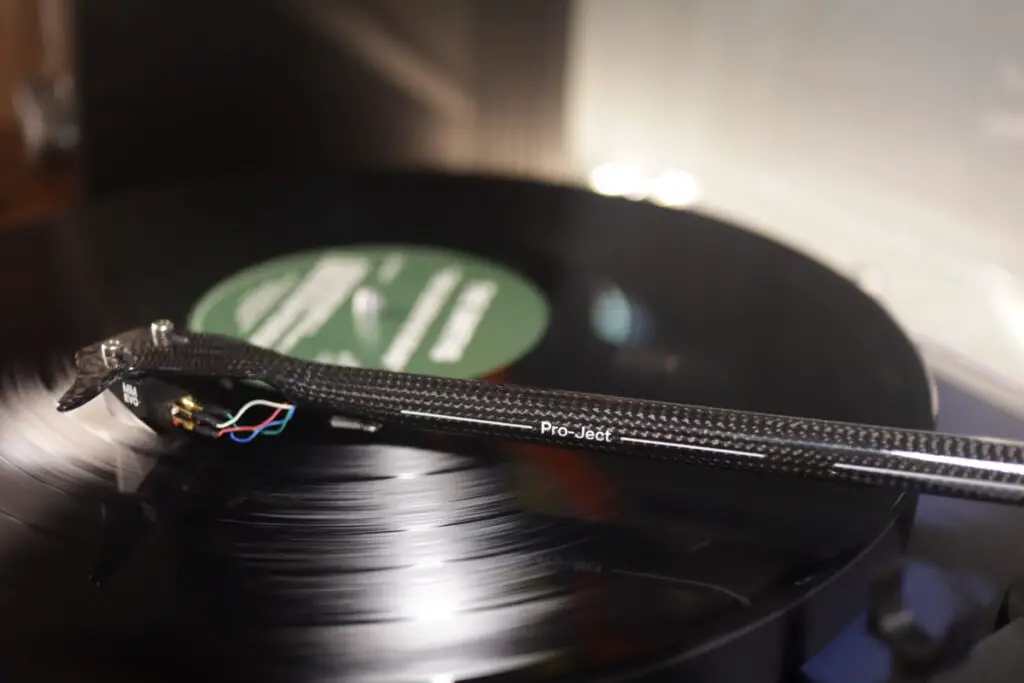
As expressed by the company owner, Heinz Lichtenegger, although you might not be able to hear the impact of one single upgrade individually, each additional point of resonant control adds up to a large improvement in tone and clarity at the final output.
Lastly, The Debut Evo 2 comes pre-installed with the Pick It MM Evo cartridge, co-designed with Ortofon specifically for Pro-Ject.
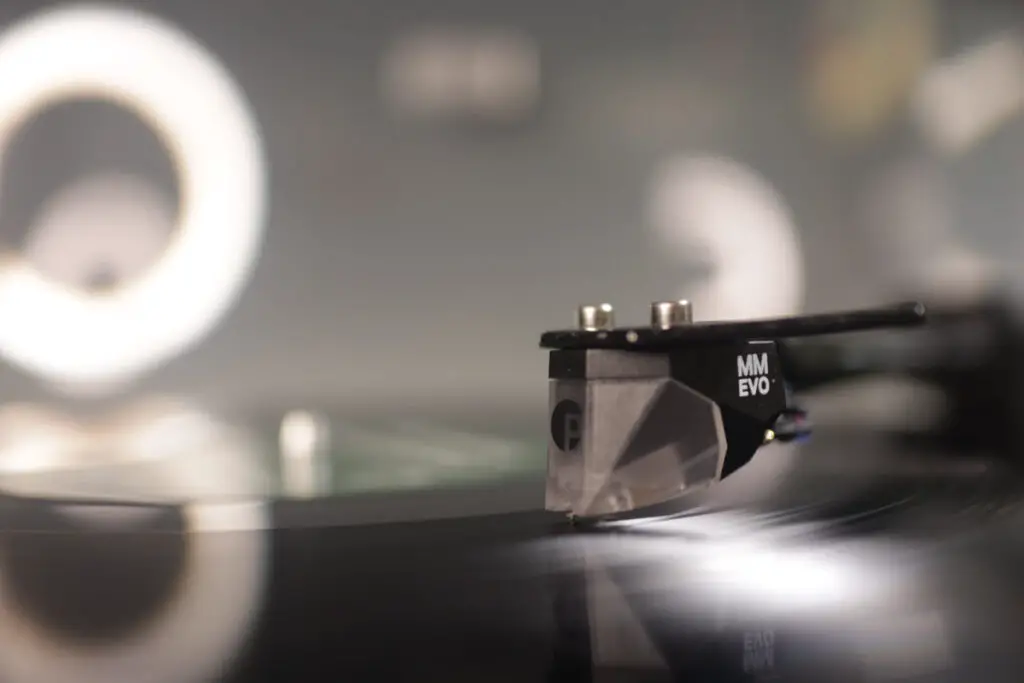
In general, I like the sound signature of Ortofon cartridges, and they work well with Pro-Ject tonearms. The Pro-Ject collaborations also blend seamlessly into their turntable aesthetics.
Speed Control
The Evo 2 retains the motor speed control function from the Debut Carbon Evo but drops the support for 78 RPM. If you’re an avid collector of shellac 78s, this feature might be missed, but given it’s a niche market, I suspect most buyers will readily swap this feature for the resonance control improvements already stated.
Changing speed remains simple via the discreet rocker switch located underneath the plinth, allowing the Debut Evo 2 to retain the cool minimalist aesthetic we’ve come to know and love from this line of turntables.
The motor suspension received a significant upgrade with the last Evo release: this model retains what Pro-Ject calls a “sophisticated suspension system”. Users can also upgrade the sub-platter to aluminum at a later date to further improve damping and speed consistency.
The closest rival to the Evo 2 is the Rega Planar 2. Both are great turntables at this pricepoint, but there are certainly pros and cons to each.
For starters, the Planar 2 has no speed control and requires a manual drive belt move on the motor pulley. The feet are also not height adjustable, and the phono cables are molded into the back.
That said, the Planar 2 sports a glass platter which feels more luxurious than the aluminium while also delivering excellent low-resonance qualities. In addition, Rega’s adjustable anti-skating control via a discreet dial is (in my humble opinion) desirable compared with the weight and wire method favored by Pro-Ject.
Overall, the Pro-Ject feels like better value for money for the addition of speed control alone, though it has to be said Rega’s optional factory-fitted Nd3 cartridge option does have something to offer tonally for those who prefer a more reserved tonal signature with a very open sound.
“Any Colour You Like”
My review sample is the “Satin Steel Blue”, which is just one of the many color choices Pro-Ject offer.
Music lovers can choose between high-gloss, satin and real wood finish options, with the satin finishes offering the most comprehensive choice. The new “Wine Red” and also the “Satin Fir Green” are some of the more creative color options that help this turntable stand out from the usual black, white, and wood veneer choices offered by most manufacturers.
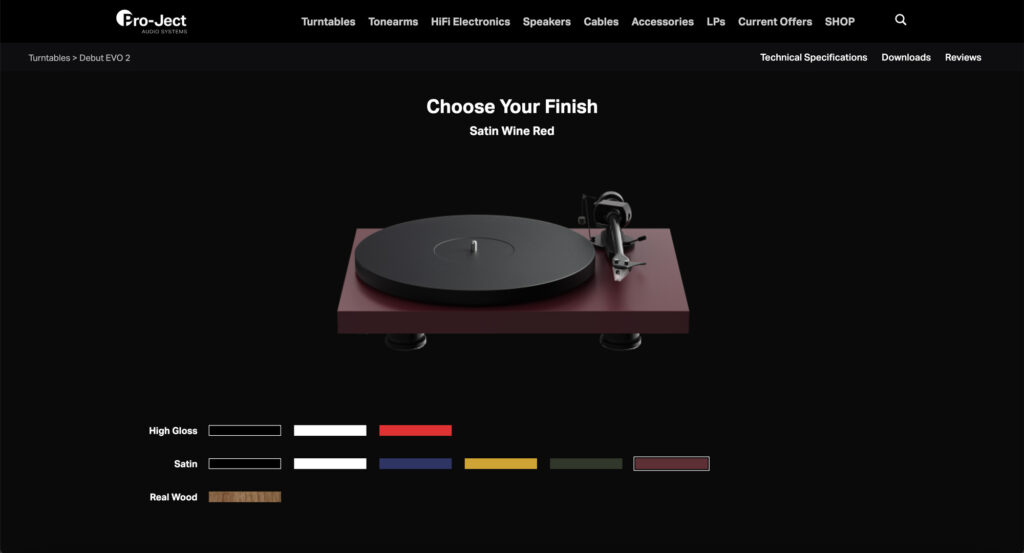
Listening Tests:
Feature lists are one thing, but the proof of the pudding is always in the eating. I lined up several records for the listening test, including Nirvana’s In-Utero, The Smiths The Queen is Dead and Portishead Dummy.
The Pro-Ject Debut Evo 2 delivers a listening experience marked by warmth and precision, showcasing a full-bodied sound profile that excels in detail. The bass is punchy yet controlled, providing a solid foundation without overshadowing other frequencies. Mid-range performance shines, bringing vocals and instruments to the forefront with natural clarity. High frequencies are smooth and refined, avoiding any harshness that can sometimes be found in budget-friendly turntables.
The MM Evo cartridge really helps the Debut Evo 2 deliver an impressively musical mid-range overall – particularly showcasing layered instrument details and up-front vocals.
Listening to Nirvana’s In-Utero, The Pro-Ject Debut Evo 2 captured the raw power and chaotic energy of Scentless Apprentice with remarkable clarity. The grungy guitar riffs felt thick and aggressive, yet the turntable’s precision allowed the layered distortion to remain distinct. Dave Grohl’s drumming was punchy, each hit tight and resonant, while Kurt Cobain’s intense vocals came through with visceral grit, highlighting the raw emotion.
For the Smiths rendition, I was impressed at how the jangly guitars on Bigmouth Strikes Again sounded crisp and bright, showcasing Johnny Marr’s intricate playing with impressive clarity. The Debut Evo 2 rendered Morrissey’s vocals with natural warmth, bringing out the subtle inflections and irony in his delivery. The driving rhythm section stayed cohesive and energetic, making the overall presentation lively and immersive.
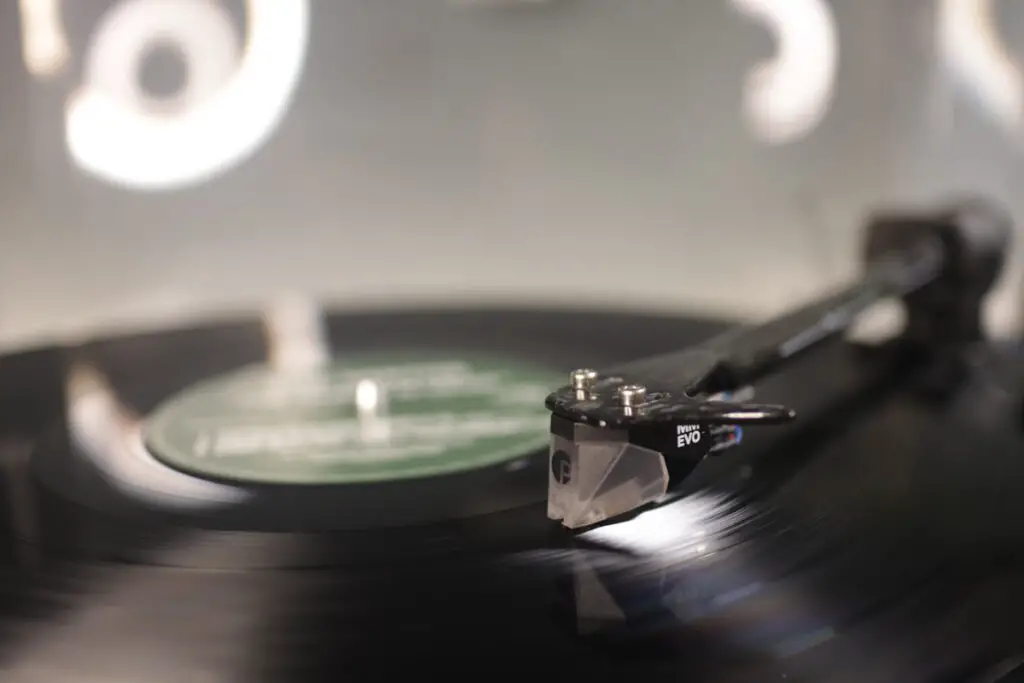
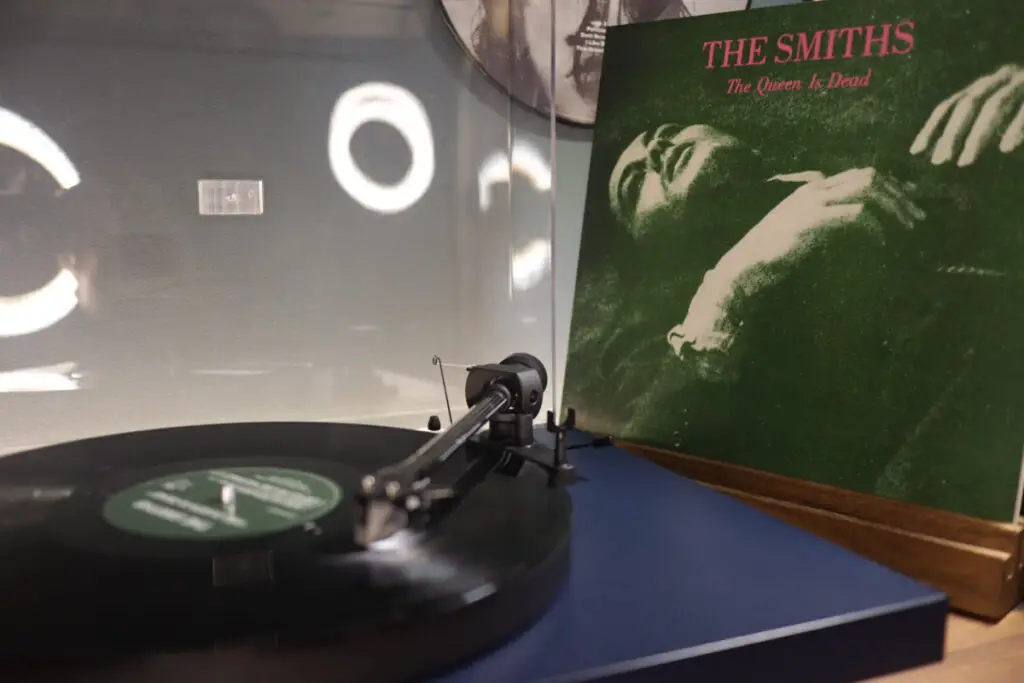
The Bottom Line:
When it comes to turntables, the sum is always greater than the individual parts. Pro-Ject have continued to improve on an established classic, going the extra mile to squeeze as much performance as possible from a relatively cost-effective design.
Although some of the improvements are subtle in isolation, they unite to produce an expansive soundstage, offering excellent separation and a deep, immersive quality that makes the Evo 2 an unquestionable class leader.
For many vinyl lovers, the Debut Evo 2 will represent a sweet spot for audiophile performance at an affordable price. HiFi sound quality meets sleek design and user-friendly features; Pro-Ject’s new Debut model comes highly recommended in this price category.

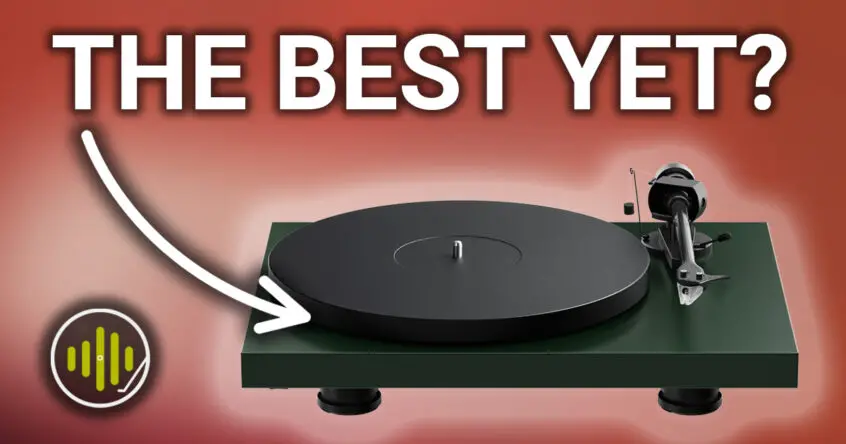


Every review I’ve read, or video I’ve watched, which is just people’s opinions, seems entirely one-sided, saying that the Fluance RT85 is a better table than the Project Debut Evo 2 or the Rega Planner 2. Additionally, the RT85N series, which comes with the Nagaoka MP-110 cartridge, has a superior sound quality to that of either of the two other table cartridges.
Maybe someone else has a different opinion from those reviews, but it would be the exception and not the rule.
Thanks for reading and commenting. I’ve reviewed the RT85. It’s a great buy. I’d disagree that it’s as black and white as one being better than the other. The Fluance benefits from detachable headshells, which are great for convenience, but I’d say the tonearm design and bearing construction on the Pro-Ject is much more geared at prioritising “audiophile” concerns, such as stability and controlling resonances. If you try moving the Fluance tonearm, there is some “play” in the bearing, which you won’t find on this turntable.
The RT85 does come stock with an acrylic platter though, which is undoubtedly an upgrade, and the Nagaoka cartridges definitely have their following as a lot of folks prefer them over the sound signature of Ortofon carts. They’re just different though, different sound for different taste.